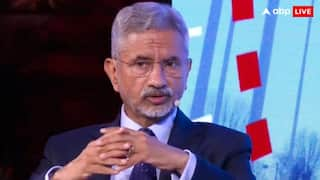Explorer
Modi in Davos: PM hits out at protectionism; says terrorism, climate change grave threats
Prime Minister Narendra Modi on Tuesday cautioned the world against growing protectionism even as he spoke of climate change and terrorism as the biggest challenges facing the world.

Prime Minister Narendra Modi on Tuesday cautioned the world against growing protectionism even as he spoke of climate change and terrorism as the biggest challenges facing the world.
NEW DELHI: Prime Minister Narendra Modi on Tuesday cautioned the world against growing protectionism even as he spoke of climate change and terrorism as the biggest challenges facing the world. He listed three issues -- climate change, terrorism and protectionism -- as the three "serious" challenges the world is facing. Modi said many societies and countries were becoming self-centered. "It seems globalization, opposed to its definition, is shrinking. Everybody talks about inter-connected world, but it seems globalisation is fading. "We believe progress and development can be truly called development when everyone can partake in it," he said. In what was seen as an apparent reference to policies like America First, especially since US President Donald Trump will be coming to Davos later this week, Modi said, "Many countries are becoming inward focused and globalisation is shrinking and such tendencies can't be considered lesser risk than terrorism or climate change." Protectionism is rearing its head and there is risk of new tariff and non-tariff barriers coming up, the prime minister said, as he mentioned that division is not the solution to this problem of anti-globalisation. "Mahatma Gandhi had said I don't want doors and windows of my house to be closed and I want winds of cultures of all countries to come inside but I won't accept it if that uproots my own culture," Modi said. After Modi's speech, BJP President Amit Shah said, "The surge of protectionism against globalisation is a challenge every part of the world is facing."
What is protectionism Protectionism involves any attempt by a country to to impose restrictions on trade in goods and services. Investopedia defines protectionism as: Government actions and policies that restrict or restrain international trade, often with the intent of protecting local businesses and jobs from foreign competition. Protectionism has a broad definition that encompasses a number of different economic policies designed to restrict trade and protect domestic manufacturers. Main forms of protectionism Import tariffs: It involves taxing the imported goods in order to increase the cost to importers and raises the price of the imported goods in local markets. Import quotas: Putting a limit on number of products that can be imported over a set period of time. Domestic Subsidies: Subsidising costs or providing cheap loans to domestic companies. It lowers the cost of production for domestic business. Administrative barriers: Governments can impose regulations or trade barriers that restrict imports or exports of goods or services through mechanisms other than the simple imposition of tariffs. Exchange controls: Government may limit the foreign exchange that can move between countriesThe surge of protectionism against globalisation is a challenge every part of the world is facing. The solution to this problem lies in understanding and accepting changing scenarios. Gandhi ji's example shows India's inherent open outlook.
— Amit Shah (@AmitShah) January 23, 2018
Related Video
Breaking: Deadly Chinese Manja Claims Lives Across India; Multiple Injuries Reported
Follow Breaking News on ABP Live for more latest stories and trending topics. Watch breaking news and top headlines online on ABP News LIVE TV
Top Headlines
Election 2025
World
News
India





































